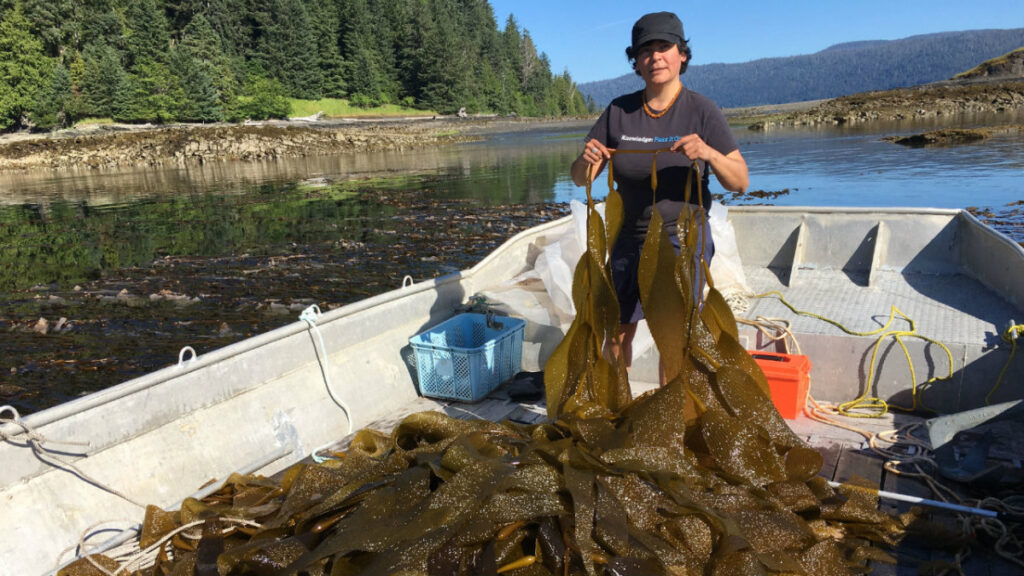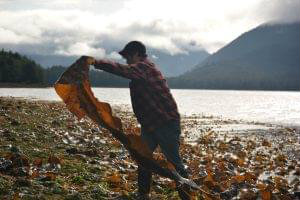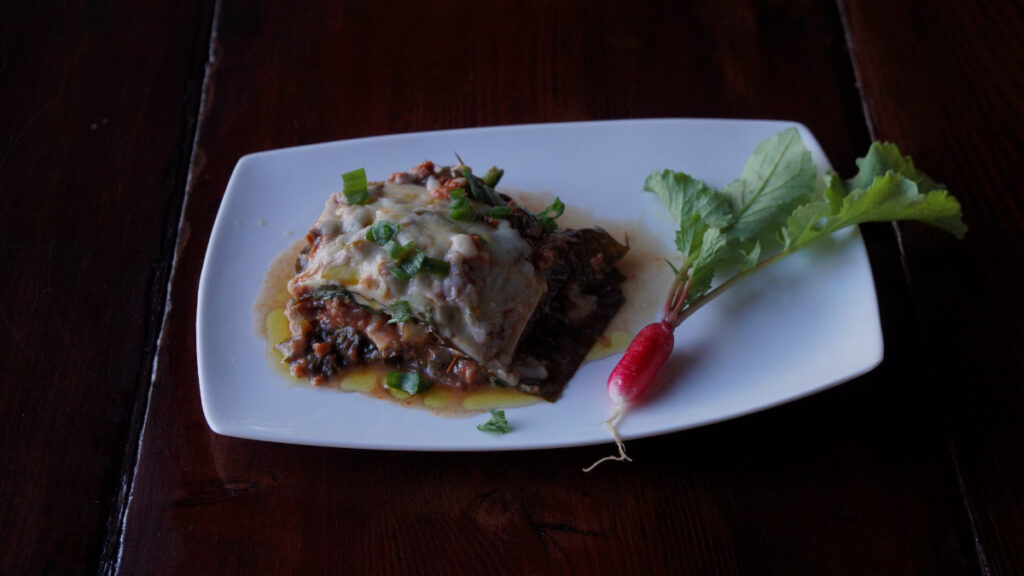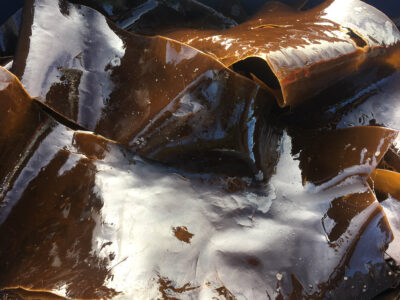North Pacific Kelp Wild Foods Get Directions
We hand-harvested kelp in Haida Gwaii, B.C.
We hand-harvested kelp in Haida Gwaii, B.C.
For hundreds of years, British Columbia’s Coastal First Nations have farmed the vast kelp forests of our coastline. Nations often traded seaweed among each other to promote the ties of kinship, with the tradition enduring to modern times at feasts such as Potlatch.
While the benefits of kelp have long been known to Indigenous communities, Dafne Romero, owner of North Pacific Kelp Wild Foods, is on a mission to share those benefits with a wider audience. Dafne is deeply connected to the land and waters that make up her home of Haida Gwaii. Her business hand-harvests wild kelp, sea asparagus and wild mushrooms with minimal impact on the lush undersea environment.
In fact, less than ten per cent of the total kelp beds are harvested, leaving a sustainable and healthy marine canopy. This commitment to sustainability respects the land of the Haida and the Indigenous peoples who have inhabited the Haida Gwaii islands for thousands of years.
We caught up with Dafne to hear more about her unique business.
Tell us what you do at North Pacific Kelp Wild Foods
At North Pacific Kelp Wild Foods we hand harvest kelp from the pristine waters around Haida Gwaii. We harvest three different species, which are laminaria – super well known in Japanese cuisine; Wakame, which is very popular in Japanese and Chinese cuisine, and Macrocystis Giant Kelp which is one of the most well known among the local Haida community. Giant Kelp is one of the most important seaweeds used by the Haida in a very traditional way.

After we harvest the kelp, we bring it to our kelp processing plant where it gets dehydrated and we assess what will be used in each one of our products. We also harvest wild mushrooms. We have dedicated local pickers that sell their mushrooms to us and we also dehydrate those before making products out of them.
Ultimately, what we do is hand harvest all our raw materials, add value to them, and sell them as kelp and mushroom products.
With such delicate eco-systems, how do you ensure harvesting is done in a sustainable way?
That’s a really important question and it’s a constant challenge for us. No matter what we do, we are always going to have an impact on the local eco-system. All we can do is work to limit that impact. We do this in a few different ways. We always harvest less than five per cent of the biomass in an area, but usually it’s way less than one per cent.
 We have various areas of kelp beds around Haida Gwaii that have been licensed by the Ministry of Agriculture and the Council of the Haida Nation. Within those areas, we rotate to have the smallest impact we can. For example, we know that Pacific Herring spawn in a certain area each March, so we’ll steer clear of that area so we don’t disturb them.
We have various areas of kelp beds around Haida Gwaii that have been licensed by the Ministry of Agriculture and the Council of the Haida Nation. Within those areas, we rotate to have the smallest impact we can. For example, we know that Pacific Herring spawn in a certain area each March, so we’ll steer clear of that area so we don’t disturb them.
We also do a lot of monitoring. The ecosystem below the surface is like a forest, and the more you know about what lives there, and when, the more you understand the impact of what you’re doing. It isn’t just fish that live there, it’s snails, shrimp, crab and the kelp itself. In order to create sustainable harvesting, we put great effort into understanding the stresses on the ecology of this undersea forest. The more we understand, the better we can help to preserve it.
What kind of health benefits can people enjoy from your kelp products?
For starters, kelp is incredibly rich in calcium, it has essential minerals, fibers, proteins and oils. It’s been shown to boost energy levels and it’s a really great food to mix in for those looking to eat healthier. There’s nothing artificial added throughout the entire process – it’s hand harvested, dehydrated, and people eat it. That’s it. It’s incredibly straightforward and there’s nothing processed or unnatural about it. I know this term gets used a lot, but it’s quite the superfood!

Where can people find your products for sale?
I absolutely adore doing farmers markets as it allows me the time to speak to people face to face and educate them about kelp and what we do. We are at the Riley Park Farmers Market in Vancouver this winter, and we’ll be there from December until March. We’re also at Hastings Park Market in Vancouver, and you can find the full list of stores around the province on our website.
Why is it so important for people to support small businesses like North Pacific Kelp Wild Foods?
People have never had more choice for where to spend their money, but the more we support small businesses, the more access we have to real foods, dedicated service and businesses who understand our communities. When you shop with big business, you don’t have that same connection. Maybe I’m biased, but I believe it’s really important people know where their food is coming from and you can chat to small business owners and have them answer those questions. You’re also supporting your local economy. When you shop local you are benefitting without even knowing, as it’s more money going towards local services and local jobs.

What are some of your favourite small businesses?
I love Skipper Otto’s because they purchase directly from fishermen, they pay fair prices and they are a very ethical business. I meet so many people from Farmers Markets and I think people should support their local farmers markets whenever they can. They are out there working hard every day, no matter what the weather is like. They are connected to the products they sell and their products are usually really high quality!
We hand-harvested kelp in Haida Gwaii, B.C.
Summit Tiny Homes are a Vernon-based designer and manufacturer of custom-built tiny homes.
Read the Full Story Back to Top
Back to Top
We respectfully acknowledge our place of work is within the ancestral, traditional and unceded territories of the Xʷməθkʷəy̓əm (Musqueam), Sḵwx̱wú7mesh (Squamish) and səl̓ilwətaʔɬ/sel̓ílwitulh (Tsleil-Waututh) and that we serve the Peoples of the many Nations throughout British Columbia.